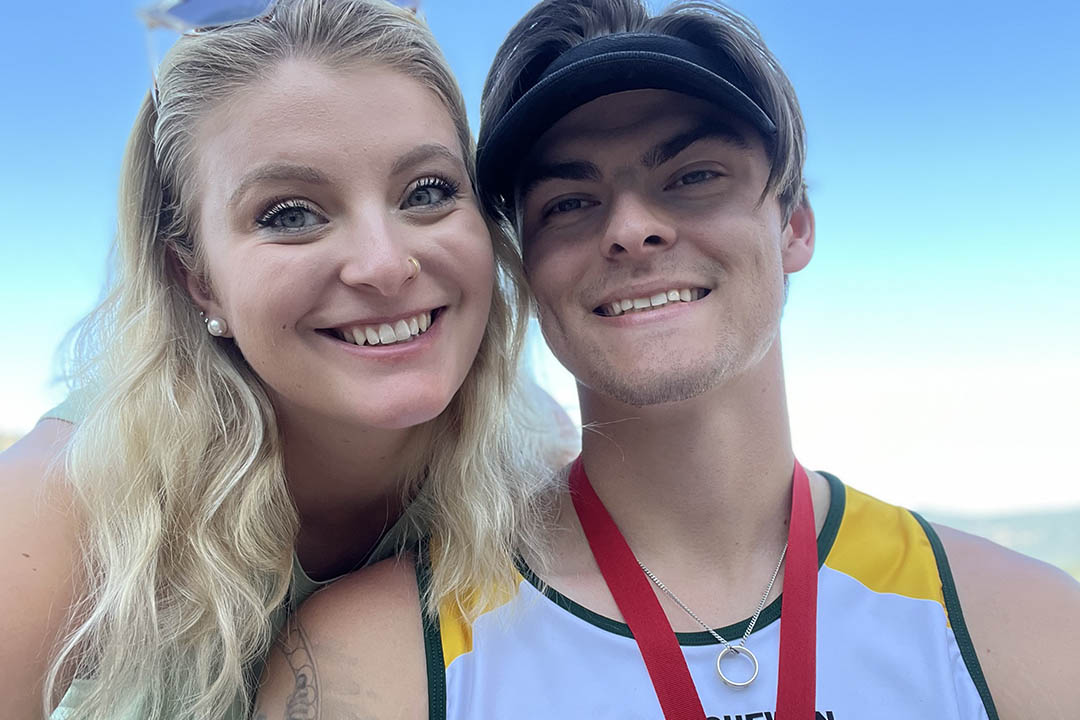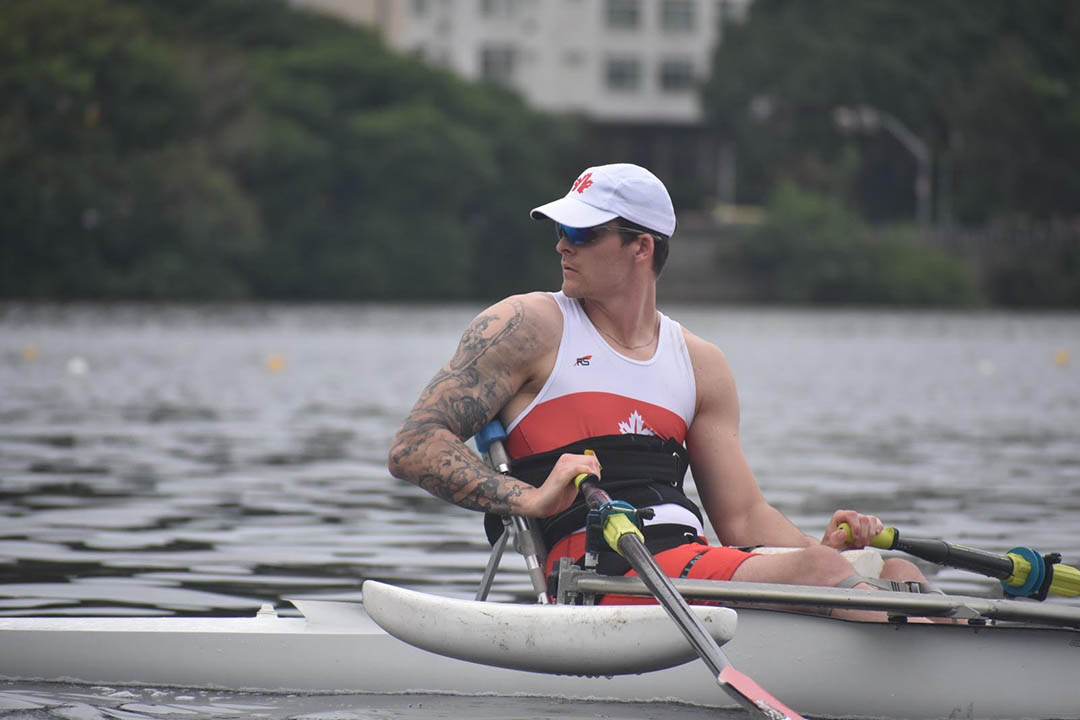
From tragedy to triumph: USask student pursues Paris Paralympics
Jacob Wassermann’s road to recovery has put him on a path to Paris.
By James ShewagaIn a meteoric rise in just his second year of competing in the sport of para rowing, the 24-year-old University of Saskatchewan (USask) College of Education student is on the verge of competing in this summer’s Paris Paralympics. One of the 13 survivors of the horrific Humboldt Broncos bus crash six years ago that took 16 lives, Wassermann was left paralyzed from the waist down, as the former goaltender began the long process of healing from the physical and mental effects of his devastating injuries and the loss of his junior hockey teammates and close friends.
Through it all, Wassermann has found comfort and peace through his lifelong passion for competition and his quest to be an elite athlete at the highest level.
“The crash put me in a wheelchair, but I am still the same person and I still have the same desire and drive to be a competitive athlete and that never really changed for me,” said Wassermann. “I have been an athlete my whole life and it just comes so naturally to me that this is what I want to be doing with my life, is to compete. So I have kept competing, and kept training. It focuses me. I love the competition and I don’t think that is something that will ever go away, that competitive drive. And rowing is the sport that has filled that drive for me.”
Wassermann’s rapid rise in the sport sent ripples throughout the rowing community after he won the gold medal in the men’s PR1 2,000-metre race at the 2023 Canadian Para Rowing Championships in Victoria, and followed it up by earning a silver medal at the 2024 World Rowing Americas Paralympic Qualification Regatta in Rio de Janeiro, Brazil on March 16. His remarkable performance secured another boat (qualifying place) in the Paris Paralympics for Team Canada, a spot that Wassermann is now the leading candidate to fill when the Paralympic rowing team for Paris is officially announced in June.

“When it was announced that we had qualified, I got tons of messages from people from all over, including the hockey world, from people who are pro athletes and coaches, so the support has been amazing and I really appreciate all of it,” said Wassermann. “It is exciting and we are now just waiting for June when the team will be announced. How it works in rowing is you have to qualify boats for a spot, and then an athlete is named to it. So that spot is not officially named yet for any athlete, but I will be working hard all summer to try to make sure it will be me who is going.”
Wassermann never expected to make a splash in the sport this soon, but is now firmly focused on preparing for Paris and hoping to have the opportunity to compete with the best in the world at the Paralympic Games.
“It has happened really quickly,” said Wassermann, who competes in the PR1 category for spinal cord injuries (use of arms and shoulders only). “I know when I first started, partway through last summer some of my friends and family were joking that they should be booking their tickets to Paris right now, but my coaches and I were focusing on L.A. in 2028 and were kind of planning our training schedule for the next four years. So this sort of sprung up quicker than anybody was really expecting, but it will be an amazing opportunity, if I do get to go and experience the Games.”
After first trying his hand at sledge hockey and adaptive water-skiing, Wassermann drifted into rowing almost by accident, but it wasn’t long before he was leaving competitors in his wake. In October of 2022, he checked out rowing for the first time at a Saskatoon Rowing Club open house event and quickly fell in love with the sport that has become his passion.
“I was just looking for a new sport to try and I was in a grocery store and met a friend, who is also in a wheelchair, and he said the rowing club was having a day to come try it out and I went and did it,” said Wassermann. “I was really into weightlifting and training and working on my health and fitness and I thought this would be another good way to do that. And once I got there, I just really liked the people in the club and especially once we got onto the water. There are not many feelings that are better than just rowing down the river.”
The club members welcomed Wassermann with open arms, and quickly became some of his biggest supporters.

“During the summer, training with the high performance group every day, you are just out there on the water training like anybody else,” said Wassermann. “So, the Saskatoon Rowing Club has been awesome. I can’t carry my own boat, so people always help carry the boat and any equipment that I need, so they are great. And here in the province and at nationals, people are the same way, so it has been awesome to have that support. Having the rowing community behind you is amazing.”
Wassermann has also been encouraged by the other survivors of the Broncos bus crash, a group that has grown incredibly close while dealing with their shared grief and their will to move forward.
“The support from the guys has been awesome. They are family to me and they are my hype guys and I get messages from them all the time and they are all excited about what I am doing right now,” said Wassermann, who met up with his old teammates on April 6 on the solemn sixth anniversary of the crash. “We are in contact all the time and we try to get together at least once a year. The majority of us just got together for the anniversary (of the crash) and that was really special. Most of the time on the anniversary it is just guys spending it on their own or with their family, but getting everybody together that weekend was really special and made that anniversary easier for a lot of us.”
Wassermann has also found plenty of support on campus, from classmates to professors, as he studies to become a teacher one day.
“I am really looking forward to getting into the classroom, and I have my first (student teaching) placement in May and it is going to be back home in Humboldt, so that will be great,” said Wassermann, who has found the Education Building very accessible for his classes. “It is pretty easy in a wheelchair, so getting to classes isn’t a problem. And with competitions, I have had professors who have been very helpful when I have had events come up really quick and they have been very supportive with my classes. So the university has been very good to me and all of my professors have been really helpful, and I appreciate that.”
Through it all, he has found his closest supporters remain his family, from his mother Mara and father Kirby back in Humboldt to his younger brother Daniel, who is also studying at USask. And most of all, Wassermann points to his partner for life – his wife Madison, a social worker for a non-profit organization in Saskatoon.
“She is always there for me, through the good days and the difficult days,” said Wassermann, who is looking forward to celebrating their third wedding anniversary together this year. “She has been my biggest supporter throughout all of my sports changes and the changes in my degree when I decided to change colleges after taking arts and psychology, and was thinking of studying nutrition, before moving into education. She has always been there for me, and is always out there helping out when I am on the water, too.”
As he continues to prepare for Paris, Wassermann rows six days a week – often twice a day – and lifts weights as he patiently waits to learn whether he has indeed officially secured his spot on the national team to compete against the best in the world at the Paralympic Games.
“That would be a dream come true,” he said. “For as long as I can remember, I wanted to be a professional athlete. And competing in the Paralympics or Olympics is the biggest stage in the world, so to wear the Maple Leaf like I did in Rio would be quite the honour and I hope to be able to do it in Paris.”
Together we will support and inspire students to succeed. We invite you to join by supporting current and future students' needs at USask.

